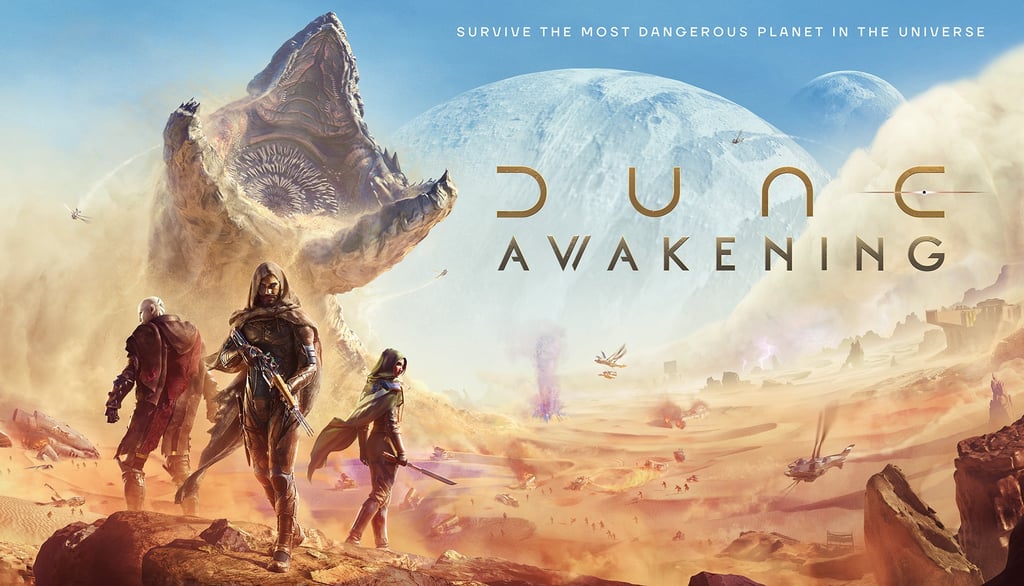Dune: Awakening – Raw Survival and Politics in a Deadly Desert
Dune: Awakening is an open-world survival MMO set on the unforgiving planet of Arrakis. In this vast desert, every drop of water is vital, every journey carries risk, and every decision can lead you to glory… or death. With a design that deeply respects Frank Herbert’s saga, the game offers a demanding, immersive, and ever-evolving experience where personal survival intertwines with the social and political tensions of the Dune universe.
REVIEWS
Carles "Zettai"
7/17/20254 min read


Introduction
Arrakis is not just a setting—it’s a character. One that challenges you, punishes you, and rewards you if you learn its rules. Dune: Awakening, the new online survival title developed by Funcom, aims to immerse players in a hostile and layered world where the desert never forgives mistakes and loneliness can become your greatest enemy.
This is neither a traditional MMO nor just another survival game. It’s an ambitious blend of both genres, with touches of RPG and crafting, that avoids established formulas to carve its own path. After more than 60 hours exploring its systems and world, what emerges is a game as fascinating as it is demanding—one that doesn’t try to please everyone, but could captivate those willing to fully commit to its uncompromising vision.
Narrative and the Dune Universe
From the very first minutes, Dune: Awakening makes clear its absolute respect for the source material. The game breathes Dune into every detail: from managing water as the most precious resource to the Holtzman shields, stillsuits, and ornithopters.
Arrakis is depicted with uncommon fidelity—not just in its barren, majestic aesthetics but in its function as a coherent world. Sandstorms can alter expeditions, melange (spice) is both coveted and dangerous to harvest, and PvE/PvP zones mesh seamlessly into a larger ecosystem simulating the ruthless struggle for territory.
The story unfolds in an alternate timeline, granting creative freedom while retaining the essentials: noble houses, political rivalries, factions, betrayals, the spice cycle, and the fight for survival. The main narrative progresses individually, but the shared world organically reflects the saga’s core themes: survival, power, and adaptation.
Gameplay and Progression
Dune: Awakening doesn’t welcome you with open arms. It demands effort from the start—especially if you play solo. The gameplay loop revolves around gathering resources, building shelters, crafting gear, and traversing a vast, dangerous map. But it avoids monotony: every outing requires planning, every resource comes with risks, and every technological upgrade feels meaningful.
Progression is steady but slow. There are no shortcuts. Earning a reliable suit, a vehicle, or a base able to withstand the desert are milestones that mark tangible growth. The crafting system is extensive, filled with recipes that expand as you invest in the game’s mechanics.
Co-op is the most rewarding way to play. Solo play is possible, but many challenges are clearly designed to be shared. With a partner, the experience is smoother and more fulfilling. The game never forces you into a large guild, but it makes clear that sharing responsibilities lightens the burden of Arrakis.
Combat and Survival
Combat is a mixed bag. Ranged encounters with firearms and abilities are dynamic and satisfying. Branches like Mentat, Bene Gesserit, or Swordsman allow for distinct playstyles.
Melee, however, is problematic. The lore-inspired “slow blade” mechanic is a clever concept but poorly executed. Timing feels off, animations sometimes lag, and hit detection can be unreliable. Early melee combat can feel like luck over skill. Later upgrades and gear improvements ease frustrations, but the rough edges remain.
Survival systems, on the other hand, shine. Water isn’t just a counter—it’s a constant obsession. You’ll extract it from corpses, optimize your stillsuit, set up moisture traps, and plan expeditions around hydration. This unrelenting pressure makes survival intense and deeply rewarding.
World Design and Exploration
Arrakis isn’t just a map—it’s the greatest enemy. The world design ensures the environment itself is the ultimate threat. Dynamic storms, treacherous terrain like Hagga Rift (a rocky labyrinth of vertical layers), and an ever-present risk of getting stranded make exploration tense and meaningful.
Every expedition carries uncertainty: a precious resource, a deadly beast, or a dead-end that drains your supplies. Frustration is inevitable at times, especially when losing a vehicle or running dry in hostile zones. But this very tension defines the Dune: Awakening experience—a game that keeps you on edge even when you think you’re safe.
Crafting and Base Building
Crafting and construction are pillars of survival. Nearly everything must be made, improved, or assembled: weapons, suits, tools, defenses, water traps, vehicles, storage, and production stations.
Crafting spans multiple disciplines that evolve with use, allowing specialization or shared tasks in co-op. Crafting requires not just materials but also quality considerations, blueprints, and the right facilities.
Base building is modular and consistent with Dune’s universe. You can set up personal shelters or larger outposts shielded against the elements. But nothing is fully safe: storms and PvP raids threaten even well-built bases. Unlike more sandbox-style survivals, you can’t build anywhere—location, protection, and planning are vital. Functionality outweighs aesthetics, and a well-designed base can mean the difference between survival and collapse.
Sound Design
The soundscape bolsters immersion. The score blends atmospheric tones, subtle synths, and Arabic-inspired motifs that perfectly evoke Arrakis’ harsh mystique.
Sound effects—from the hiss of desert winds to the hum of ornithopters and the crunch of sand underfoot—are grounded and organic. Gunfire, explosions, and equipment have impactful audio cues that favor authenticity over flash.
Voice acting (currently limited, in English) is subdued but effective. Most NPCs communicate through text, though occasional voice lines lend authority. Spanish text localization is already available, though a more thorough dubbing/localization would be welcome.
The Good
Extraordinary atmosphere: faithful, coherent, and deeply immersive
Well-designed survival mechanics, especially water management
Tangible, rewarding progression
Tense and meaningful exploration
Deep crafting and base-building tied to the universe
Freedom to play solo or in small groups without mandatory guilds
Authentic integration of Dune lore: shields, spice, politics, betrayal
The Bad
Clunky melee combat with unreliable responsiveness
Areas like Hagga Rift can feel overly punishing
Aggressive difficulty curve for solo players
UI and menus unintuitive in certain sections
Conclusion
Dune: Awakening isn’t for everyone—and that’s its strength. It doesn’t try to please; it challenges. In a sea of formulaic MMOs and survival titles, Funcom’s Arrakis adventure stands out for its personality, fidelity to the source, and refusal to smooth its rough edges.
Real survival, tangible progress, meaningful decisions, and a world that constantly reminds you that you don’t belong. Funcom has captured not just the world of Dune, but the experience of Dune—boldly, ambitiously, and with room to grow.
If endgame content can sustain its PvE focus and narrative-driven play without leaning too heavily on massive PvP, this could be one of the most unique and significant genre entries in years.
Final Score: 8.5/10
Recommended for:
Fans of the Dune universe seeking a faithful, challenging experience
Survival players who enjoy constant tension and resource management
Explorers drawn to high-risk, high-reward gameplay
Those who appreciate slow but meaningful progression
Crafting/base-building enthusiasts in hostile settings
Available on: PC, with console release planned for 2026
© 2025. All rights reserved.
And remember, if you’re into games... you’re into Sector Gaming!
